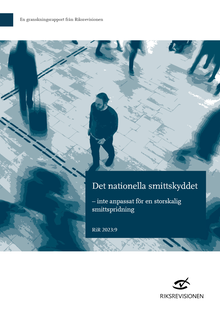Sweden’s national communicable disease control needs to be strengthened
National communicable disease control works well under normal circumstances, but needs to be strengthened to increase the capacity to deal with future pandemics. Shortcomings in the regulatory framework, inadequate systems and data for national surveillance, and shared responsibility for infection prevention and control impact the effectiveness of disease control.

Photo: Jens Lindström
The Swedish National Audit Office has audited Sweden’s national communicable disease control. The overall conclusion is that several aspects of disease control need to be strengthened in order to increase the capacity to deal with future pandemics and other situations with large-scale spread of disease.
“The Government’s governance has not allowed scope for the fact that disease control needs to function effectively both under normal circumstances and during a pandemic. In addition, the Communicable Diseases Act is not designed to handle situations with large-scale spread of disease,” says Auditor General Helena Lindberg.
The audit also shows that shared responsibility for infection prevention and control leads to unclear governance. This means that preventive efforts within disease control are not being carried out actively, systematically and strategically.
“Cohesive national responsibility for infection prevention and control could contribute to more effective disease prevention. However, that requires regions and municipalities to work preventively and in a long-term perspective in health and social care,” says Ann-Christin Johnreden, Project Leader for the audit.
The Swedish National Audit Office also notes that the major development needs in disease control that became apparent during the COVID-19 pandemic suggest that the Public Health Agency of Sweden was not sufficiently prepared for a situation with large-scale spread of disease. In particular, there are shortcomings in systems and data for national follow-up and surveillance. For example, the following are completely or partially missing:
- a digital system for contact tracing and testing
- a comprehensive vaccination follow-up system
- national support for analyses of vaccination coverage and investigations into disease outbreaks
- rapid and robust national healthcare data.
At the same time, the audit shows that communicable disease control is a complex area. An effective way of managing an outbreak of an infectious disease in one situation may prove to be ineffective in another situation. In addition to the Swedish NAO’s recommendations, collaboration and efficient cooperation among stakeholders at national, regional, and local level are therefore absolutely essential for providing effective disease control.
Recommendations in brief
The recommendations to the Government include the following:
- concentrate national responsibility for infection prevention and control under one government agency
- investigate the legal prerequisites of the Public Health Agency of Sweden and the National Board of Health and Welfare for collecting and managing healthcare data.
The Swedish NAO’s recommendations to the Public Health Agency of Sweden include the following:
- draw on lessons learned and experience from the COVID-19 pandemic to further develop disease control, including follow-up and knowledge support.
See the report for the recommendations in full.
The Public Health Agency of Sweden and the regions share responsibility for communicable disease control
Communicable disease control for society shall meet the population’s needs for protection against the spread of communicable diseases. Responsibility for disease control is shared between the Public Health Agency of Sweden and 21 Regional Medical Officers with powers to exercise authority. At national level, the Public Health Agency of Sweden shall coordinate and develop communicable disease control. The regions are responsible for the operational disease control activities. The audit shows that conditions for conducting effective disease control vary between regions. This affects the effectiveness of central government governance in the area of communicable disease control.
Press contact: Olle Castelius, phone: +46 8-5171 40 04.
Presskontakt: Olle Castelius , telefon: 08-5171 42 06.
Share in social media and by e-mail
Contact form
Send your questions or comments via the form below and we will make sure that they reach the right member of staff. Please state if your question concerns the information on this particular page.


